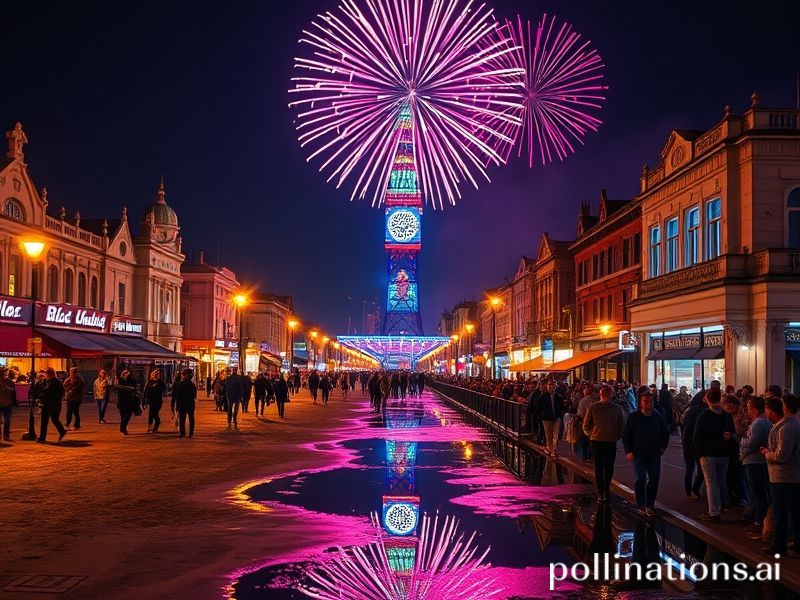Blackpool’s Fireworks: When the World Agrees to Blow Up the Sky Together
Blackpool’s Fireworks: A Pyrotechnic Mirror for a World That’s Already on Fire
By the time the first shell arcs over the Irish Sea and detonates in a chrysanthemum of magnesium and regret, half the planet is watching—some via livestream, others through the grainy lens of a refugee-camp phone charger jury-rigged to a car battery. The annual Blackpool Fireworks Championship, held each autumn on England’s northwest coast, has quietly become the United Nations of controlled explosions: teams from China, Germany, the Philippines and, inexplicably, Switzerland (a nation whose global brand is discretion and chocolate) gather to see who can make the sky look most like a battlefield without actually starting one.
In a saner era this would be mere municipal pageantry—candy floss, cheap lager, and a few ooh-aahs before the coach ride home. But these are not sane times. While the rockets ascend, the North Sea wind carries whispers of cost-of-living crises, Baltic pipeline sabotage, and the latest cryptocurrency exchange implosion. Each bang is answered, somewhere far below the decibel threshold, by the muffled thud of a housing market collapsing or a grain export deal unraveling. The audience, wrapped in £3 plastic ponchos that will outlast human civilization, claps on cue.
The Chinese delegation—state-sponsored artisans who normally illuminate Party Congresses—have choreographed their sequence to a medley of Adele and Vivaldi, a soft-power flex so subtle it could only be deliberate. Meanwhile the German crew, true to form, has submitted a detailed 47-page safety dossier and a carbon-offset invoice no one asked for. The Philippine squad, whose fireworks are famously funded by diaspora remittances and questionable lottos, dedicate their show to overseas domestic workers who send 30% of their wages home and 70% of their loneliness skyward.
And then there’s the crowd itself: a UN General Assembly of stag parties, pensioners, and TikTokers angling for the perfect slow-mo. A Yorkshireman in a Borat mankini shouts “G’won Taiwan!” at a firework shaped, vaguely, like a contested island chain. Two teenagers from Kyiv livestream under the handle @ShelterSkelter, raising crypto donations with every burst. Somewhere in the throng a retired Kremlin analyst sips tepid tea and mutters, “We used to do this over Grozny, minus the applause.”
Economists will tell you the event injects £15 million into the local economy, which is roughly what Elon Musk misplaces in sofa change. Political scientists will note that rival nations are literally competing to see who can paint the sky prettier without breaching the Outer Space Treaty. Climate scientists, poor bastards, crunch the numbers and discover that tonight’s spectacle equals the annual CO₂ output of a medium-sized Pacific at nation; their report is drowned out by a crescendo of silver weeping willows.
When the grand finale arrives—a synchronized volley that spells “HOPE” in flaming serif—half the viewers read “HYPE” instead. Phones capture the moment, filters auto-correct the smoke into pastel sunsets, and the footage is uploaded to servers cooled by the same oceans these fireworks briefly outshine. Within hours, arms manufacturers will study the choreography for “crowd-pleasing dispersal patterns.” Insurance brokers will add “atmospheric bombardment” clauses. Someone, somewhere, will file a patent.
And yet, for six minutes and forty-three seconds, the world agrees to stare upward instead of at each other’s throats. A fragile consensus forged in gunpowder and whimsy; a ceasefire signed in glitter. When the last ember fizzles into the black water, Blackpool’s promenade smells of cordite and fried onions—an olfactory metaphor for modern history. The tide will wash the debris away by morning, but the videos loop endlessly, a low-resolution promise that if we must blow things up, we can at least synchronize the detonation to a backing track.
The coaches pull out. The cleaners sweep up the spent casings, each one a tiny monument to the human talent for spectacular distraction. And somewhere in the dark, a child who crossed three borders to get here asks her mother, wide-eyed, “Will there be more tomorrow?”
The honest answer is yes, darling—just not always in the sky.







